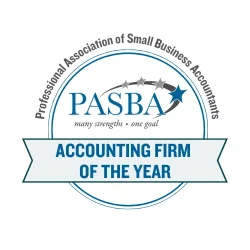Learn essential contractor accounting strategies to manage income, expenses, and taxes efficiently with guidance from J.R. Martin & Associates.
As a contractor, managing your finances can be both empowering and daunting. Unlike traditional employees, contractors bear the responsibility of handling their own taxes, tracking business expenses, invoicing, and maintaining accurate financial records. Although this added responsibility may seem overwhelming, following a few structured accounting practices can simplify your financial management and set you on a path to sustained business success. This guide will walk you through the essentials of contractor accounting, covering everything from income tracking to taxes and accounting software.
1. Understand Your Income Structure
Contractors typically deal with a variable income stream, which can fluctuate depending on client contracts and seasonal trends. Recognizing and planning for this variable income is essential.
- Track Every Income Source: Record every payment from clients, specifying one-off projects versus recurring contracts. Tracking each income source will help you better plan for future months and identify patterns in your earnings.
- Use a Consistent System: Set up a regular schedule for income tracking, whether weekly or monthly. This consistency will help you identify any discrepancies and make sure all income is accounted for, especially if payments come in from various sources.
- Prepare for Taxes: Unlike traditional employees, contractors need to plan for taxes upfront. Many contractors set aside 25-30% of their income for tax obligations. Establishing a separate tax savings account can be useful.
2. Separate Your Personal & Business Finances
It’s easy for contractors to fall into the trap of mixing personal and business expenses, but doing so complicates accounting, heightens the risk of mistakes, and makes tax season more stressful.
- Set Up a Dedicated Business Account: Open a separate bank account specifically for business income and expenses. Having a business account makes it easier to track spending, calculate profit, and avoid IRS scrutiny.
- Consider a Business Credit Card: If possible, use a business credit card for business-related expenses. This can simplify expense tracking and help build a credit history for your business.
- Document Transfers Carefully: If you need to transfer money between your business and personal accounts, label these as ‘owner’s draws’ or ‘capital contributions’ to clarify their purpose.
3. Track Every Expense Accurately
Expense tracking is key for contractors, especially when it comes to tax deductions. Keeping precise records ensures you claim all eligible deductions and have an accurate picture of your business’s profitability.
- Identify Deductible Expenses: Deductible expenses may include business supplies, equipment, software, office rent, utilities, and professional fees. If you work from home, you may qualify for the home office deduction, allowing you to write off a portion of your rent, utilities, and internet.
- Use Accounting Software or an App: Choose an expense-tracking app or accounting software that allows you to photograph receipts and categorize expenses in real time. This not only makes tracking easier but also helps with audit preparedness.
- Regularly Categorize and Reconcile: Don’t wait until the end of the month or year to categorize expenses. Set aside time each week or month to update your expense records and make sure all entries are accurate.
4. Manage Your Invoices Efficiently
For contractors, invoicing is the lifeblood of cash flow. A well-structured invoicing system helps ensure that you get paid on time.
- Use Professional Invoicing Tools: Many accounting software platforms offer customizable, professional-looking invoice templates. QuickBooks, FreshBooks, and Xero are popular options that allow you to send, track, and automate invoice reminders.
- Establish Clear Payment Terms: Specify payment terms (like net 30 or net 15 days) on each invoice, so clients know when payment is due. Clear terms reduce confusion and help prevent payment delays.
- Follow Up Promptly on Overdue Invoices: Have a system for following up on late payments, whether through automated reminders or personal outreach. Prompt follow-ups show clients that you take payment terms seriously.
5. Plan for Taxes Throughout the Year
Contractors are responsible for managing their tax payments throughout the year, including self-employment taxes.
- Estimate Quarterly Taxes: Most contractors are required to make quarterly estimated tax payments. Calculating these estimates can be challenging, so consider using tax software or consulting an accountant. For more details, check out our guide on how to file taxes as an independent contractor.
- Know Your Deductions: Knowing what you can deduct helps lower your taxable income. Common deductions include office supplies, travel expenses, professional fees, home office expenses, and health insurance.
- Keep a Calendar of Deadlines: Missing a tax payment deadline can result in costly penalties. Keep a calendar or set reminders for quarterly tax payments, annual filings, and other important dates.
For additional guidance on tax obligations, deductions, and filing requirements, visit the IRS Self-Employed Individuals Tax Center to ensure compliance and maximize your tax benefits.
6. Utilize Accounting Software Tailored for Contractors
Accounting software can be a valuable tool for contractors, helping streamline income and expense tracking, invoicing, tax reporting, and more.
- QuickBooks Self-Employed: Offers income and expense tracking, mileage tracking, and basic invoicing, making it a popular choice for contractors.
- FreshBooks: Known for its simple, user-friendly invoicing features, FreshBooks also offers expense tracking, time tracking, and reporting tools.
- Xero: Ideal for contractors who plan to grow their business and may need payroll or advanced inventory tracking.
- What to Look For: When choosing software, prioritize features like automated invoicing, expense tracking, tax reporting, and real-time cash flow analysis.
7. Prepare for Lean Income Periods
Seasonal or project-based work can lead to periods of low income, so having a financial cushion is essential. The SBA’s guide to managing finances offers practical strategies for budgeting, financial planning, and maintaining business health, especially useful for contractors managing variable income
- Build an Emergency Fund: Aim to save enough to cover at least three months of expenses. This fund can help you through leaner times without disrupting your business.
- Evaluate Quarterly: Each quarter, reassess your income and expenses to adjust savings goals and refine your budget.
- Consider Diversifying Income: Offering additional services or skill-based training can help boost income during slower periods.
8. Know Your Financial Statements
Understanding financial statements is crucial for contractors aiming to keep a pulse on their business’s health and profitability.
- Profit and Loss Statement (P&L): Summarizes your income, expenses, and net income over a period. It’s one of the most important statements for understanding profitability.
- Balance Sheet: Lists assets, liabilities, and equity, giving a snapshot of your financial position at any given moment.
- Cash Flow Statement: Tracks cash inflows and outflows, helping you monitor liquidity and anticipate future cash needs.
9. Stay Compliant with Tax and Labor Laws
Contractors must comply with all applicable tax and labor laws to avoid fines and penalties.
- Register Your Business: Depending on your state, you may need to register as a sole proprietor, LLC, or corporation. Each has different tax implications, so consult a tax professional if needed.
- Obtain Necessary Permits and Licenses: Ensure you’re legally allowed to perform your work, as some types of work require specific licenses.
- Stay Informed on Tax Requirements: Sales tax requirements may vary based on your location and services. Research your state’s tax laws to understand if you need to collect and remit sales tax.
10. Consider Hiring a Professional Accountant
Even with the best software and diligence, managing taxes and finances alone can be overwhelming. Hiring an accountant may be a wise investment.
- Benefits of Hiring an Accountant: Accountants can help with tax planning, ensure you’re maximizing deductions, and represent you in the case of an audit.
- Budget for Accounting Services: While hiring an accountant is an additional expense, the potential savings in tax deductions, time, and peace of mind can outweigh the costs.
- Schedule Regular Reviews: Regular check-ins with your accountant can help you adjust your tax strategy and financial practices as your business grows.
How J.R. Martin & Associates Can Support You
Managing finances as a contractor can be complex, but with the right strategies, you can maintain financial health and focus on growing your business. Implementing structured accounting practices, such as separating personal and business finances, diligently tracking expenses, and planning for taxes, is essential. Utilizing accounting software tailored for contractors can further streamline your financial processes.
For personalized assistance, consider partnering with professionals who specialize in contractor accounting. At J.R. Martin & Associates, we offer comprehensive accounting and tax services designed specifically for general and trade contractors. Our services include accurate bookkeeping, proactive tax planning, and efficient tax filings, all aimed at maximizing your profitability and reducing tax liabilities.
By collaborating with J.R. Martin & Associates, you can navigate the complexities of contractor accounting with confidence, ensuring your financial operations are streamlined and your business is positioned for success.
Learn how you can partner with J.R. Martin & Associates – schedule a phone call today!



